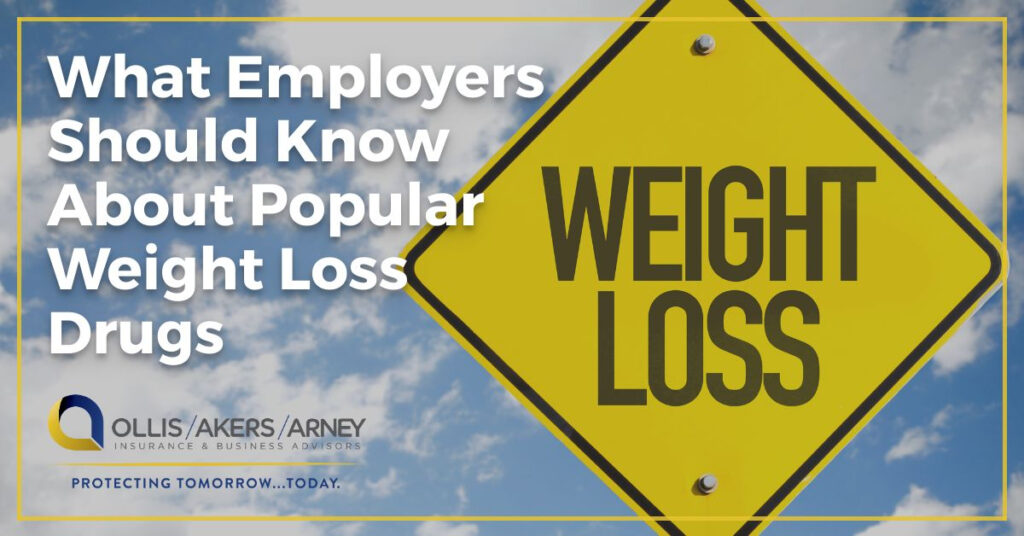The popularity of weight loss drugs has reached a fever pitch in the United States. This trend has made its way into the workplace, with employees increasingly asking their employers about coverage for popular drugs used for weight loss, such as Wegovy. Other drugs intended to treat Type 2 diabetes, such as Ozempic or Mounjaro, are also in high demand for off-label weight-loss use. As a result, employers are presented with the decision of whether to cover these expensive drugs or face potential negative attraction and retention repercussions in the coming years, if not already.
This article provides a general overview of popular weight loss drugs and explores what employers should know about them.
How Obesity Impacts the Workplace
Obesity is a chronic disease that impacts more than 4 in 10 American adults, according to the Centers for Disease Control and Prevention (CDC). By 2030, nearly half of U.S. adults are expected to be obese. According to the CDC, in 2019, medical costs for adults with obesity were, on average, $1,861 higher than for adults with a healthy weight. The annual medical cost of obesity in the United States was $173 billion in 2019.
Nearly a quarter of U.S. employers say employee obesity has the largest impact on overall health costs, according to International Foundation of Employee Benefits Plans (IFEBP) survey data of more than 500 organizations. Employers have traditionally approached weight loss by promoting or even sponsoring physical wellness initiatives, including weight loss challenges, daily step competitions and biometric screenings. Addressing obesity helps individuals avoid more expensive medical treatments and can prevent the development of chronic conditions. Because of this and employees’ recent demands for weight loss drugs, many employers are searching for new approaches to help employees instead of simply paying for gym memberships, offering wellness programs or organizing weight loss competitions. By supporting efforts to lose weight and combat obesity, employers can help employees improve their overall health and reduce their odds of developing other related health conditions, such as Type 2 diabetes and high blood pressure. This can help keep employees healthier and more productive, which can also help employers lower their overall health care costs and improve their bottom line.
Overview of Popular Weight Loss Drugs
The recent string of popular weight loss drugs are types of glucagon-like peptide 1 (GLP-1) receptor agonists—medications originally prescribed to treat diabetes but have been shown to be effective in helping individuals to lose weight. These drugs can potentially transform the health of millions of Americans by decreasing their weight by as much as 15%; this may help treat and address several weight-related conditions, including heart conditions, diabetes and musculoskeletal issues.
These drugs work by lowering an individual’s blood sugar levels. While GLP-1 drugs have not been extensively tested on individuals with obesity, they have the side effect of sending fullness signals to the brain, which produces an anti-appetite effect leading to weight loss. However, individuals may need to take these drugs indefinitely to maintain any weight loss benefits. Other side effects include nausea, vomiting and diarrhea.
While GLP-1 drugs like Ozempic and Mounjaro are currently only approved to treat diabetes, Wegovy was approved by the U.S. Food and Drug Administration (FDA) in 2021 to treat chronic weight management in addition to diabetes. Although Ozempic is not FDA-approved for weight loss usage, some health care providers have prescribed it to individuals who have difficulty losing weight through traditional means (e.g., diet). As of this writing, pharmaceutical company Eli Lilly is seeking FDA approval to use Mounjaro to treat obesity. On average, GLP-1 treatment costs more than $1,000 per individual each month.
While most private health insurance doesn’t cover these obesity drugs, nearly 130 million adults would be eligible for GLP-1s because of their weight and other health conditions if they were covered (e.g., individuals with a body mass index [BMI] greater than 30 or those with a BMI greater than 27 and weight-related comorbidity), according to Bloomberg. Only 10 state Medicaid programs currently provide coverage for obesity drugs, with eight additional states considering changes to cover these drugs. Medicare does not cover weight loss drugs.
Considerations for Weight Loss Drugs
Employers have traditionally not covered weight loss drugs. Data from the IFEBP revealed that only 22% of employers cover prescription weight loss drugs, although the percentage is higher for employers with 5,000 or more employees. In comparison, 45% of employers surveyed cover bariatric surgery and 32% cover weight management programs.
However, increased demand from workers and obesity concerns among U.S. adults are forcing employers to consider comprehensive obesity care benefits, including offering weight loss drugs. A recent survey from Ro and the Obesity Action Coalition revealed that 51% of workers with obesity would stay in a job they didn’t like if they received obesity treatment coverage, and 44% would change jobs to obtain coverage for obesity treatment. Therefore, while weight loss drugs may be extremely costly, they may help strengthen employers’ attraction and retention efforts.
Employers should consider the following when deciding whether to cover weight loss drugs.
Expensive Treatments
Prescription drugs typically drive a large percentage of an organization’s health care spending. Adding weight loss drugs to a health plan would likely substantially increase an employer’s health care expenses, especially since using drugs like Ozempic to manage weight loss is extremely expensive. Deciding to cover weight loss drugs may result in employers seeing significant spikes in their health care costs, especially if multiple employees receive the drugs to lose or manage their weight. For some employers, these costs may prove too difficult to absorb.
Drug Design
GLP-1 drugs were not originally designed to treat weight loss. In situations where individuals use them for this purpose, they may not be effective over the long term if used for a short period of time. Therefore, employers who cover these treatments to treat weight loss may be required to make a sustained commitment for employees to experience weight loss benefits; as a result, they’re likely to incur significantly higher health care costs. Employers may also want to consider these drugs’ possible side effects and the fact that they are relatively new.
Health Plan Coverage
Because most GLP-1 drugs aren’t FDA approved for weight loss, most insurers will not cover them when used for that purpose. If they are not covered by health insurance, workers must pay out of pocket to use the drugs for weight loss. Further, most health care professionals will not prescribe these drugs for weight loss unless an individual is obese—meaning they have a BMI of 30 or more—and has difficulty losing weight using traditional methods. Some health care providers may prescribe GLP-1 drugs to individuals with obesity if they also have weight-related health conditions, such as high blood pressure. Moreover, even if an individual obtains coverage of a GLP-1 drug for weight-related treatment, it does not guarantee permanent coverage for this purpose, which could negate any weight-related benefits if they lose coverage in the future.
Prerequisites, Limits and Alternatives
As more employees ask their employers to cover these drugs, some organizations are requiring employees to participate in lifestyle modification programs as a prerequisite for coverage, while others are asking employees to participate voluntarily. According to a recent survey of over 150 employers and health by pharmacy benefit consulting company Pharmaceutical Strategies Group, 22% of employers who cover FDA-approved weight loss drugs require employees to participate in a lifestyle modification program in order to be eligible for the drugs. For 20% of employers, participation in such programs is voluntary. Additionally, some employers are placing limits on coverage of weight loss medications in terms of either dollars or duration of treatment.
Some employers are exploring alternative approaches to providing weight loss benefits to employees, including covering psychology-based weight loss programs like Noom to support employees in losing weight. In some cases, these programs offer prescriptions for obesity drugs, like Wegovy, for approximately $120 per month, as well as cheaper weight loss medications that can help reduce food cravings.
What Can Employers Do?
Since using GLP-1 drugs for weight loss is relatively new, there’s uncertainty surrounding their effectiveness for weight loss and management. As a result, some employers are adopting a wait-and-see approach before covering these drugs. Other employers have decided to permit lower-cost weight loss drugs before covering GLP-1 drugs.
Organizations can also consider alternatives to covering GLP-1 drugs. For example, weight loss programs can be an effective and affordable alternative to GLP-1 drugs. These programs can change individuals’ behavior to help workers develop lasting healthy habits and provide personalized weight loss coaching.
Summary
Many employers still consider weight loss a lifestyle problem instead of a health issue. As a result, they don’t believe weight loss drugs are medically necessary. However, as employee attitudes and demands shift, some employers may be unable to avoid a more deliberate approach to employee obesity. While it’s still uncertain whether GLP-1 drugs are effective in treating obesity, employers should monitor any developments closely and find ways to holistically improve employee wellness.
Reach out to Ollis/Akers/Arney Insurance & Business Advisors for health care resources.
This Benefits Insights is not intended to be exhaustive nor should any discussion or opinions be construed as professional advice. © 2023 Zywave, Inc. All rights reserved.


